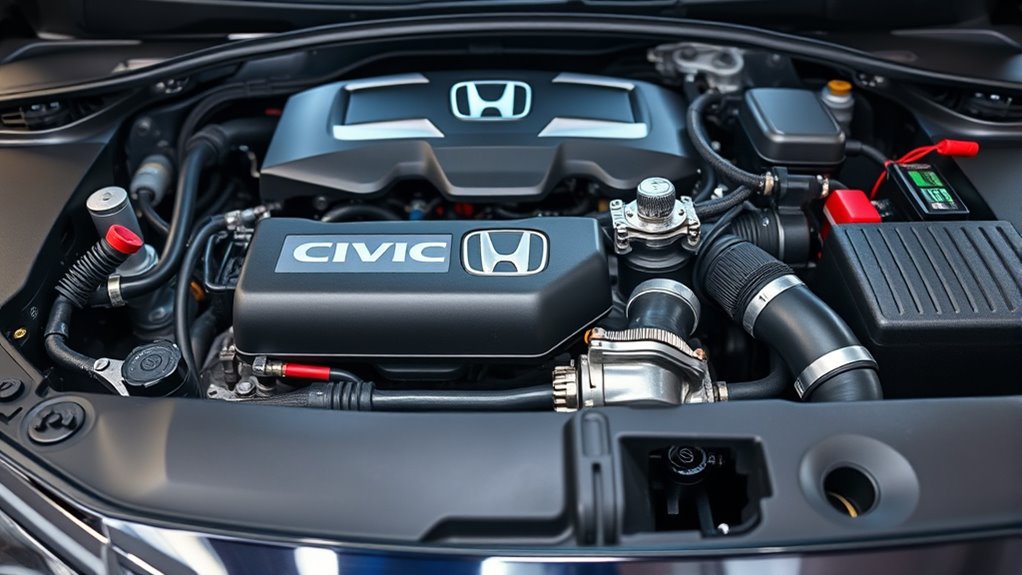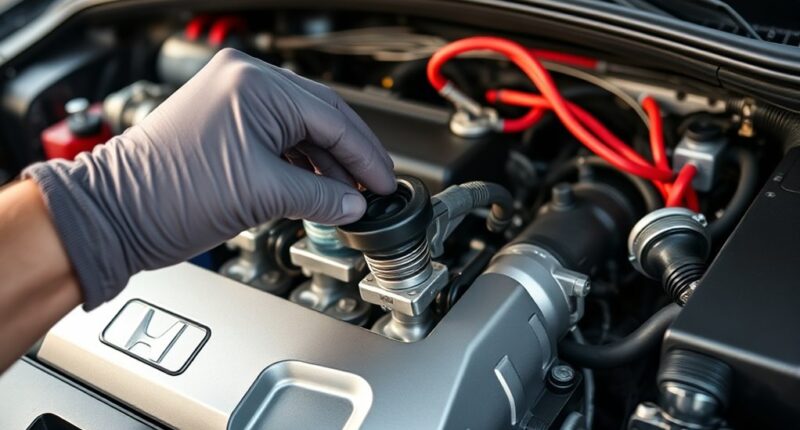To eliminate rev hang on your modern Civic, start by ensuring your transmission fluid is fresh and at the correct level, as high-quality fluid improves shifting and responsiveness. Adjust your clutch properly to fully disengage during shifts, reducing unnecessary engine revs. You can also explore ECU tuning or aftermarket modifications to sharpen throttle response and minimize rev hang. Taking these steps can markedly boost your driving experience—keep going to discover even more effective solutions.
Key Takeaways
- Regularly check and replace transmission fluid with high-quality, fresh fluid per the owner’s manual.
- Ensure proper clutch adjustment to fully disengage during shifts, reducing rev hang.
- Consider ECU tuning or throttle response upgrades to improve engine reaction and minimize rev delay.
- Learn and practice smooth shifting techniques to reduce abrupt engine rev changes.
- Address any transmission or clutch issues promptly to maintain optimal shifting performance.

Rev hang, the delay in revving the engine after shifting gears, has long been a frustration for modern Civics enthusiasts. When you shift from one gear to another, especially in a manual transmission, you expect a smooth transition. Instead, you often experience a lag where the engine revs stay high before dropping back down. This delay can feel jarring and reduce your driving enjoyment. Fortunately, you can take steps to eliminate or at least minimize rev hang, and much of it involves understanding your car’s transmission system and making some adjustments.
One of the first things to check is your transmission fluid. Transmission fluid lubricates and cools the moving parts inside your gearbox, ensuring smooth gear shifts. If the fluid is old or low, it can cause gear changes to feel sluggish or delayed. You should regularly inspect the transmission fluid level and color, and replace it if it’s dark, gritty, or if it’s been a while since the last change. Fresh, high-quality transmission fluid can improve shifting performance, reducing the delay that causes rev hang. Keep in mind that some Civics have different transmission types—manual or CVT—so check your owner’s manual for the recommended fluid specifications and change intervals.
Check and replace your transmission fluid regularly for smoother gear shifts and reduced rev hang.
Another essential component to focus on is clutch adjustment. If your clutch isn’t properly adjusted, it can lead to incomplete disengagement when shifting, which causes the engine revs to stay high longer than necessary. Proper clutch adjustment ensures that the clutch fully disengages when you press the pedal, allowing for a quicker and smoother shift. This adjustment isn’t complicated; it involves tightening or loosening the clutch cable or adjusting the hydraulic clutch system, depending on your model. When the clutch is properly adjusted, your shifts will feel more precise, and rev hang will be markedly reduced. Additionally, understanding how transmission control systems influence shifting behavior can help you optimize your driving technique further.
In addition to fluid and clutch adjustments, you might consider tweaking your driving technique or upgrading certain components like the throttle response or ECU tuning. Some enthusiasts opt for aftermarket modifications that help the engine respond more quickly to throttle inputs, further diminishing rev hang. However, start with the basics—ensure your transmission fluid is fresh and at the proper level, and confirm your clutch is properly adjusted. These simple yet effective measures can vastly improve your shifting experience, making your Civic feel more responsive and enjoyable to drive. By paying attention to these details, you’ll soon notice a smoother, more connected driving experience free from the annoying delay of rev hang.
Frequently Asked Questions
Does Rev Hang Affect Fuel Efficiency Significantly?
Rev hang can affect your vehicle’s fuel efficiency by causing the engine to stay at higher RPMs longer than necessary, which increases fuel consumption. It can also impact engine performance, making your drive less smooth. While the effect might not be huge on every trip, over time, the extra fuel used adds up. Addressing rev hang helps optimize engine performance and can save you fuel, making your driving more efficient.
Can Aftermarket Modifications Eliminate Rev Hang Completely?
You wonder if aftermarket parts and engine tuning can eliminate rev hang completely. While performance modifications can reduce rev hang by improving throttle response, they often can’t eliminate it entirely because of inherent design features of modern Civics’ throttle bodies. Upgrading specific components like throttle controllers or tuning your ECU can make a noticeable difference, but complete elimination isn’t always feasible due to manufacturer constraints and safety considerations.
Is Rev Hang More Common in Certain Model Years?
Imagine rev hang as a shadow lingering longer in some model years. You’ll notice it’s more common in certain years, like early 2010s, due to manufacturing differences and model year trends. These differences affect how quickly the throttle responds, leaving a ghostly delay. As technology advances, newer models often shed this shadow, making rev hang less noticeable. So, your car’s age and manufacturing choices shape how prominently rev hang appears.
How Does Rev Hang Impact Engine Longevity?
Rev hang can impact engine longevity by causing unnecessary stress on engine components. When revs stay high longer than needed, engine temperature rises, increasing wear. Poor throttle response during rev hang can lead to abrupt shifts or over-revving, further stressing the engine. Over time, this adds up, potentially reducing engine lifespan. Managing rev hang helps maintain ideal engine temperature and smooth throttle response, promoting better long-term engine health.
Are There Specific Driving Techniques to Reduce Rev Hang?
Think of your manual transmission as a dance partner; smooth moves matter. To reduce rev hang, you can practice gentle clutch release and precise throttle control, especially during launches or shifting. Using launch control features when available helps keep revs steady. These techniques minimize unnecessary rev fluctuations, improving engine response and longevity. With patience and practice, you’ll master the rhythm, making every drive smoother and more efficient.
Conclusion
Once, I almost stalled my Civic during a steep hill start, feeling that annoying rev hang drag me down. Just like mastering a tricky dance move, eliminating rev hang takes practice and knowing the right steps. By following these simple tips, you’ll keep your engine smooth and responsive — turning what once felt like a stumble into a confident glide. Trust me, once you get the hang of it, you’ll wonder why you ever let rev hang hold you back.









